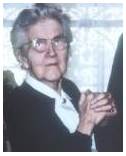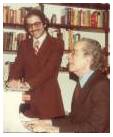Teachers, Students, Traditions, Tributes
by Leonard Lehrman ©2006
 “May you live to 120” is the traditional Yiddish wish for long life. And if Nadia Boulanger had not died in 1979, that’s how old she’d be on Sept. 16 of this year.
“May you live to 120” is the traditional Yiddish wish for long life. And if Nadia Boulanger had not died in 1979, that’s how old she’d be on Sept. 16 of this year.
Her influence continues to be felt, and the new 263-page paperback, The Conservatoire Américain: A History by Kendra Leonard (Scarecrow, 2007), should open a lot of eyes to the qualities, both good and not so good, of her legacy. I was fascinated to learn, for example, in Appendix G, that my high school instrumental music teacher, the late Harold Gilmore, had won a composition prize under Boulanger at Fontainebleau in 1966, just three years before I did. And yet, frustratingly, he is for some reason not among the 117 of us listed in Appendix F: “Selected Notable Students.” Neither are some of Boulanger’s most prominent pupils like Virgil Thomson, Marc Blitzstein, Paul Bowles, Philip Glass, Roy Harris, Thea Musgrave, Daniel Pinkham, Ben Yarmolinsky, Chris Yavelow, and Elie Siegmeister, who I guess studied with her primarily in Paris and/or Gargenville, rather than Fontainebleau.
The tradition of which she was an important part was well in evidence at pianist David Korevaar’s ebullient! Merkin Hall recital of April 11, 2007. The program drew upon the bounteous resources of the Ricardo Viñes collection at the University of Colorado in Boulder, which also houses the American Music Research Center, that has hosted tributes to Boulanger, Blitzstein, and many others. Included were early 20th century works by Jean Roger-Ducasse (reminiscent of Debussy, sentimental, then meandering), Louis Aubert’s noble Sillages, Ravel, and David Diamond disciple Lowell Liebermann, many of whose works Korevaar has recorded on Koch, and who was present for the performance. Sensitive crossed-hands work featured in the lovely encore: Anton Février’s Nocturne.
Boulanger student Elie Siegmeister will be the subject of a bio-bibliography Kenneth O. Boulton and I are putting together for Scarecrow in time for his 2009 centennial. Meanwhile, the Leopold Stokowski Society in Holland has issued recordings of live performances of his Western Suite and Symphony #1. And Naxos, which issued Ken’s 2-CD set of Siegmeister’s piano music as part of their American Classics series in 1999, has this past year brought out CD 8.559424 “Scenes from Jewish Operas, Volume 2,” including the first orchestral recording of any of his operas: the climactic final scene from his one-acter after the eponymous Bernard Malamud story, The Lady of the Lake. The very Catholic Boulanger would be turning in her grave because of the climactic stage directions: “Isabella slowly unbuttons her bodice, revealing a bluish line of numbers on her bare breasts.” Those directions were actually not followed at the October 1985 92nd St. Y premiere, as the soprano refused. (A prosthesis like the one used by Kelly Kaduce in the final scene of the recent premiere of Ricky Ian Gordon’s Grapes of Wrath was, presumably, not available.) But maybe the CD will inspire a new, less inhibited production.
Also on the recording are excerpts from Hugo Weisgall’s monumental opera Esther, along with portions of David Schiff’s Gimpel the Fool. All these works merit full recordings, which the Schiff has just received—to be reviewed next time. The Seattle Symphony plays well under Gerard Schwarz in the Siegmeister and the Weisgall. In the latter, Juliana Gondek shines in her portrayal of the title role, originally created by Lauren Flanigan. The masterful libretto by Charles Kondek also calls for a breast-baring scene, which likewise did not happen, in the very successful 1993 NYCO premiere.
It didn’t happen either at the New York Philharmonic’s first (concert) performances June 8, 9, and 12, 2007 of Paul Hindemith’s one-act opera, Sancta Susanna, op. 21 (1921), at the climax of which the title character is supposed to “tear off her wimple, veil, and girdle” as she “rips the loincloth from the crucifix.” Riccardo Muti led with great passion; a seasoned Brigitte Pinter sang the role of confidante Clementia with compassion, without a score, while Tatiana Serjan in the title role displayed a lovely voice with less than perfect diction. Marcus DeLoach, who also has a small role on the Siegmeister CD, made his Philharmonic debut (with a walk-on speaking role) as did Juliane Borg. Jane Gilbert and the New York Choral Artists performed as nuns.
 Another student of Nadia Boulanger, Elliott Carter, is approaching his own centennial, Dec. 11, 2008, with no signs of weakening. Jimmy Levine and the Met Orchestra featured his latest compositions at Carnegie Hall May 13: the three miniatures known as Three Illusions, written 2002-2004, and the 2003 Dialogues for Piano and Chamber Orchestra, with soloist Nicolas Hodges—not quite as formidable a piece as his 1967 Piano Concerto, but not unimpressive either.
Another student of Nadia Boulanger, Elliott Carter, is approaching his own centennial, Dec. 11, 2008, with no signs of weakening. Jimmy Levine and the Met Orchestra featured his latest compositions at Carnegie Hall May 13: the three miniatures known as Three Illusions, written 2002-2004, and the 2003 Dialogues for Piano and Chamber Orchestra, with soloist Nicolas Hodges—not quite as formidable a piece as his 1967 Piano Concerto, but not unimpressive either.
Carter was also featured on Gregg Smith’s awe-inspiring 50th Anniversary concert at St. Peter’s Citicorp Nov. 19, 2005, with his Harvest Home (1937, rev. 1995/7). The Easter Carol of Charles Ives (1874-1954), also appeared on the program. Living composers who were represented, and present, included Jack Beeson, John Biggs, James Fritschel, along with Edmund Najera, Fred Thayer, Dale Jergenson, and of course Gregg Smith, the last four of whom also conducted. Smith’s and Richard Thompson’s arrangements of Harold Arlen were heard, in one case with additional lyrics (to Johnny Mercer’s “Blues in the Night”) by Kim Rich. Kim was Elie Siegmeister’s last collaborator, and is working with me on an opera to be called Alger.
Thompson’s and Rich’s 52nd Street Suite, led by Jergenson, proved a rollicking finale to the Jan. 13, 2007 Gregg Smith Singers concert, again at St. Peter’s. Karel Husa’s 2000 setting of a Moravian folk song opened the program, which also featured works of Ron Jeffers, Donald Waxman, David Bennett Thomas (two N.Y. premieres, including Songs of Seasons: A Calendar of Haiku, on a Kim Rich text), Ned Rorem (Four Sonnets, deftly accompanied by Tom Schmidt on piano), Edmund Najera, and Gregg Smith (with Schmidt on organ).
Also at St. Peter’s, and also inspired by Boulanger and her students, were a series of concerts by New Music New York, organized by tenor William George and mezzo-soprano Anna Tonna. I particularly appreciated the inclusion of Marc Blitzstein’s “Modest Maid” in the April 29, 2006 “Songs of Post-War New York” program, and was gratified to have two of my own works included, along with those of Blitzstein, Bowles, Carter, Chanler, Copland, Diamond, Duke, Elwell, Glanville-Hicks, Glass, Harris, Manziarly, Musgrave, Pinkham, Siegmeister, Thomson, Trimble, and Yarmolinsky in their Americans in Paris: Songs by American students of Nadia Boulanger on March 6, 2007. I wrote a piece especially for them, to conclude their “21st Century Shakespeare” program May 1st, which I could not attend, but much enjoyed in dress rehearsal and on the excellent CD they made of the 28 numbers (12 of them premieres —including a never-performed Blitzstein Trio from A Winter’s Tale) on that concert, each one more beautiful than the last. Praise is especially due to soprano Beth Anne Hatton, mezzos Rita Litchfield and Tonna, baritone Bruce Rameker, pianist Andrew Pau, along with 5 other instrumentalists, and especially tenors Bill George and Steven Ebel, who were also represented as composers.
Mark Greenfest, who did manage to attend all of the group’s programs this season, wrote of their Oct. 8, 2006 “plugged-in” performance at the Ars Nova Theater of New Strings: New Works for String Quartet and Voices: “The short pieces ranged from pleasant to compelling; and the performances, lovely to superb. I really enjoyed this evening—the music, performers, and program balance was so right.” The May 1st concert he called “remarkable in its programming….” Among the performers, he singled out “Ms. Hatton, whose lovely tone and diction can light up an evening; Ms. Tonna, whose rich color and expression convey deep feelings; Mr. Rameker, who can inflect a vocal tone or an eyebrow to give the most perceptive performance;” and “Mr. George, the programming director, composer and colorfully controlled and energetic tenor…. Likewise, the instrumental performers gave polished to stunning performances.”
The March concert featured Rameker singing the world premiere of Siegmeister’s Lincoln in Springfield, the score of which I had just found at the Library of Congress. Wilson Southerland was the talented pianist in all but my two pieces (“The Voice of Chief Seathl” and “Kererte A Ti”), in which I accompanied Bill George and the lovely mezzo-soprano Sylvie Jensen, respectively. The program enjoyed a preview March 4th at the intimate Vertical Player Repertory, housed in the Brooklyn apartment of Judith Barnes, who shone in the title role in Darius Milhaud’s Medée, in an ambitious production with piano, 6 principals, and a chorus of 13(!) which we caught in one of its 9 performances Nov. 9-Dec. 20, 2006.
Ebel’s clear, strong, sweet voice was also heard to advantage, along with baritone Tom Meglioranza, in the American Opera Projects production at the Guggenheim of Louis Karchin’s Romulus, after the 1854 farce by Dumas père May 20 & 21. Katrina Thurman as the ingenue and Wilbur Pauley as the heavy completed the excellent singing cast, which was accompanied by 11 members of the Washington Square Ensemble, vigorously conducted by the composer, effectively staged by Peter Flynn. The musical idiom was busy and not very focused tonally, but did not get in the way of the comedy, which was very well received. This was the third AOP production we had seen, the others being Darkling, in which Marcus DeLoach stole the show with a gorgeous Lee Hoiby song at the very end, and Jan Hamer’s promising Holocaust opera after Yehuda Nir’s memoir, Lost Childhood, still in progress, and being workshopped in Tel Aviv this summer. More power—and audiences—to them all!
One of the great masters of late 20th century comic opera, Seymour Barab, was represented twice in New York this spring, first by Lou Rodgers’ Golden Fleece Ltd. May 17-20 downtown at the 14th Street Y Theater, then by the After Dinner Opera Company June 11 uptown at the Leonard Nimoy Thalia in Symphony Space. Both productions included his two-person one-acter The Duel, with confident tenor Patrick Lynch as the outwitted savvy Lover downtown, and a somewhat shaky Scott Spinnato in the same role uptown. The June performance had the advantage of surrounding the work with four more Barab pieces, all under the title The Husband, the Wife, The Lover, which just about summed up all the characters in all of them, and preceding that with two more Barab one-acts, Everyone Has to Be Free (starring a radiant Kate Amatuzzo as the Princess) and the three-part “opera skit,” Savoir (not “Savoire,” as per the program) Faire. Stage director Louisa Jonason took over the musical direction as well at the last minute, and provided vivacious piano accompaniment. Among her nine Mercyhurst College students who took all the roles, Jacqueline Edford stood out in the opening piece of the second half, My Sweet Wifey, based on a folk ballad the Weavers used to sing called “You Old Fool.” The variations on infidelity concluded on a cheery note, with all promising, in quasi-Cole Porter mode, to be “faithful in our fashion.”
 A much more musically adventurous comic opera by John Eaton, Pumped Fiction, opened the American Composers Alliance Festival at the same Nimoy Thalia June 20, 2007. The libretto by the composer’s daughter, Estela Eaton, was based in part on her own experience interviewing for secretarial jobs in California and walking into an adult toy factory specializing in penis pumps. As in the May 1 New Music New York concert, six singers and six instrumentalists participated. Except here, as in many of Eaton’s “pocket operas,” the instrumentalists also had vocal and dramatic roles to play. In fact each got to play two or three roles, including at least one penis apiece, donning appropriate hats, in a dream sequence: Pianist Christopher Oldfather got to be the Diplomat Penis, percussionist Dennis Sullivan the raping and plundering Military Penis (along with Bodybuilder Arnold). Violinist Ana Milosavljevic, cellist Jody Redhage, flutist Jane Rigler, and clarinetist Meighan Stoops got to be, respec! tively, the Femme Penis, Old Penis, Young Penis, and Liberal Penis, the last of whom intoned: “We are GUILTY! We must atone, stay down” in honor of “the innocent victims of Penistory!” Jennifer Roderer had a star turn as Mother Eris in the opening death scene, returning as Bear Mother near the end, urging her daughter on. (She was also the star of the Composers Concordance Greenwich House concert of May 18, stealing the show with Eaton’s Sor Juana Songs of 1998, singing with dramatic aplomb, even if not always exactly on the quarter-tones called for in the score.)
A much more musically adventurous comic opera by John Eaton, Pumped Fiction, opened the American Composers Alliance Festival at the same Nimoy Thalia June 20, 2007. The libretto by the composer’s daughter, Estela Eaton, was based in part on her own experience interviewing for secretarial jobs in California and walking into an adult toy factory specializing in penis pumps. As in the May 1 New Music New York concert, six singers and six instrumentalists participated. Except here, as in many of Eaton’s “pocket operas,” the instrumentalists also had vocal and dramatic roles to play. In fact each got to play two or three roles, including at least one penis apiece, donning appropriate hats, in a dream sequence: Pianist Christopher Oldfather got to be the Diplomat Penis, percussionist Dennis Sullivan the raping and plundering Military Penis (along with Bodybuilder Arnold). Violinist Ana Milosavljevic, cellist Jody Redhage, flutist Jane Rigler, and clarinetist Meighan Stoops got to be, respec! tively, the Femme Penis, Old Penis, Young Penis, and Liberal Penis, the last of whom intoned: “We are GUILTY! We must atone, stay down” in honor of “the innocent victims of Penistory!” Jennifer Roderer had a star turn as Mother Eris in the opening death scene, returning as Bear Mother near the end, urging her daughter on. (She was also the star of the Composers Concordance Greenwich House concert of May 18, stealing the show with Eaton’s Sor Juana Songs of 1998, singing with dramatic aplomb, even if not always exactly on the quarter-tones called for in the score.)
Daphne, the librettist’s ingenue alter-ego, was embodied by a vocally high-flying Linda Larson. Despite attaching tin cans to her chest in one dance sequence, her character could not succeed in attracting the attention of the male characters whose love interest dwelt mostly on themselves or each other. They included Ken Roht as Eros, James Archie Worley as Valdez, Craig Phillips as Cornelius, and the aptly named James Bobick as the (also aptly named) Dr. Bloom.
The audience for the Eaton premiere was perfect, comprised largely of composers gathered to hear each other’s works; Karl Kramer-Johansen’s musical direction and Beth Greenberg’s stage direction raised this event above the rest. Despite its thorny microtonal and serial language, one could almost go out humming the last four notes of the music, as all sang, repetitively: “The supple will prevail.”
Other highlights of the June 20-23 ACA Festival will be covered next issue.
The Eaton opus would, one would think, go very well with the current, priapically preoccupied works of David Del Tredici, celebrating his 70th birthday this year with an array of concerts, though none including, yet, his notorious and still-unperformed song cycle on The Penis Poems. In a loving tribute at the Brooklyn Conservatory of Music March 17, 2007, pianist Marc Peloquin opened with the composer’s Three Gymnopedies (2003), a musical pun-replete homage to Satie, and Bach, and Robert Helps, and DDT’s life partner Ray Warman. The rest of the program was accompanied by the composer himself: at the piano for mezzo-soprano Re’ut Ben Ze’ev’s rendition of the 6-song cycle Chana’s Story on texts by Chana Bloch; and conducting 13 instrumentalists (including a wind-machine) for soprano Melissa Fogarty in the EOS Orchestra-commissioned Dracula. Both were very impressive pieces and performances. In between, former DDT student Theodore Wiprud interviewed the composer, who carped fictively: “You still owe me a couple of counterpoint assignments!” In describing his own stylistic veer in the 1980s from serial to tonal, he quipped, perhaps echoing the famous satricial line re Al Gore and the Internet: “I think I invented tonality!”
 David Del Tredici was one of my teachers at Harvard; another was Leon Kirchner, whose Third String Quartet with Electronic Sound (largely produced by Morton Subotnick) won the Pulitzer Prize the year before I got there. It took another 40 years for him to write his Fourth Quartet, which was beautifully performed, along with the first three, by the Orion Qua! rtet at Tully Hall March 7, 2007. The new quartet, in one movement, is much shorter than any of the others, but acts as a kind of summing up, linking the Bartókian and Bergian language of the first two as a kind of epilogue to the Third—#3 and 4 being performed without pause.
David Del Tredici was one of my teachers at Harvard; another was Leon Kirchner, whose Third String Quartet with Electronic Sound (largely produced by Morton Subotnick) won the Pulitzer Prize the year before I got there. It took another 40 years for him to write his Fourth Quartet, which was beautifully performed, along with the first three, by the Orion Qua! rtet at Tully Hall March 7, 2007. The new quartet, in one movement, is much shorter than any of the others, but acts as a kind of summing up, linking the Bartókian and Bergian language of the first two as a kind of epilogue to the Third—#3 and 4 being performed without pause.
 One of the most successful composition students of Del Tredici’s (and Siegmeister’s) is Tom Cipullo, whose opera Glory Denied, adapted by the composer from the book by Tom Philpott, was given a sumptuous production at Brooklyn College May 5 & 6, 2007. David Kissel created the sets, lighting, and text projections that danced around the four singers, bringing the work to life. Someone really should have corrected his spelling and “grammer” [sic], but his creative contribution made the marital drama of expectation and betrayal both more abstract and more moving. The work is really about only two people: Colonel Floyd James Thompson, America’s longest-held prisoner of war in Vietnam, and his wife Alyce, whom he expects to be faithful to him, but is not. Cipullo has divided each of the characters into an older and younger self, making the possibilities of ensemble that much richer. Sopranos Melanie Curcio and Gretchen Mundinger, tenor Jan Heinrich Kuschel, and baritone Scott Roche each had a nice set piece or two: Cipullo knows how to set text, and how to write arias —and interludes too.
One of the most successful composition students of Del Tredici’s (and Siegmeister’s) is Tom Cipullo, whose opera Glory Denied, adapted by the composer from the book by Tom Philpott, was given a sumptuous production at Brooklyn College May 5 & 6, 2007. David Kissel created the sets, lighting, and text projections that danced around the four singers, bringing the work to life. Someone really should have corrected his spelling and “grammer” [sic], but his creative contribution made the marital drama of expectation and betrayal both more abstract and more moving. The work is really about only two people: Colonel Floyd James Thompson, America’s longest-held prisoner of war in Vietnam, and his wife Alyce, whom he expects to be faithful to him, but is not. Cipullo has divided each of the characters into an older and younger self, making the possibilities of ensemble that much richer. Sopranos Melanie Curcio and Gretchen Mundinger, tenor Jan Heinrich Kuschel, and baritone Scott Roche each had a nice set piece or two: Cipullo knows how to set text, and how to write arias —and interludes too.
A political conservative, but one open to all sorts of cultural experimentation, is the beloved teacher and composer Dinu Ghezzo, whose Retirement Concert April 28, 2007 at NYU was dedicated to the memory of Ron Mazurek (1943-2007) who had died suddenly two days before. Deviations from the printed program were not easy to follow, but Mazurek’s Satori for clarinet and electronics was a highlight, as was Joseph Pehrson’s Microproj for electronics and solo dancer — danced enticingly by his wife Linda in a white leotard. The major work was Ghezzo’s own Doina, a gorgeous semi-improvised Romanian folklore-inspired ensemble piece featuring his daughter Christine, soprano, with flutist/vocalist Wendy Luck, clarinetist Esther Lamneck, violinist Jeanann Seidman, cellist Dan Barrett, and pianist Marilyn Nonken. The evening was billed as an “i2 concert” in collaboration with the University of California, Irvine. The video connection thereto proved to be less than totally reliable, however.
I have saved the best music heard this year for last: Harold Prince’s loving tribute to Lotte Lenya, and to Kurt Weill, performed respectively by Donna Murphy and Michael Cerveris for the Manhattan Theatre Club at the Biltmore Theatre April 12-June 24, 2007. This was not just another “Berlin to Broadway” tribute with German and American hit songs, but a searing portrait of a passionate relationship, as documented and reflected in the letters of Weill and Lenya and strung togeth! er in a seamless book by playwright Alfred Uhry under the title LoveMusik. Murphy’s voice is stretched to the limit, from the squeaky youthful soprano to the smoky mature contralto. Assigning the song “That’s Him,” so memorably sung in recent years by Ute Lemper and Angelina Réaux, to Cerveris, describing Weill’s impressions of Lenya’s feelings for other men, is inspired.
Among the 12 cast members, David Pittu was outstanding as the slimy, promiscuous, but brilliant opportunist Bertolt Brecht, while John Scherer embodied Lenya’s supportive gay second husband, George Davis, who gets to sing the “September Song.” Twenty-nine numbers, many in translations from the German by Milton Granger, Michael Feingold (I wasn’t asked for mine, though the late Martha Schlamme preferred them to Feingold’s), and of course Marc Blitzstein, were aptly chosen as reflections of specific emotions felt by the characters in their saga of match and mi! smatch:
Weill, a nice Jewish boy, son of a cantor, fell hard for the child prostitute who could barely read notes but became his muse for some of the century’s greatest musical works. Blitz- stein was an important character too, writing special material for Lenya, and bringing The Threepenny Opera to life with his translation for her after Weill’s death. Too bad Prince and Uhry could not have included him. But perhaps another time.
Blitzstein’s words were present, mostly, though uncredited, in the July 24, 2007 “Music As Political Statement” concert in Washington Square Park that featured badly sung excerpts from Threepenny. Pleasant, though, was the world premiere of Eric Salzman’s suite from the original 1929 anti-war Gershwin musical, Strike Up the Band. Next issue we’ll take on Eric’s own work, The True Last Words of Dutch Schultz, that was presented by the Center for Contemporary Opera, led by Victoria Bond at Symphony Space May 19.